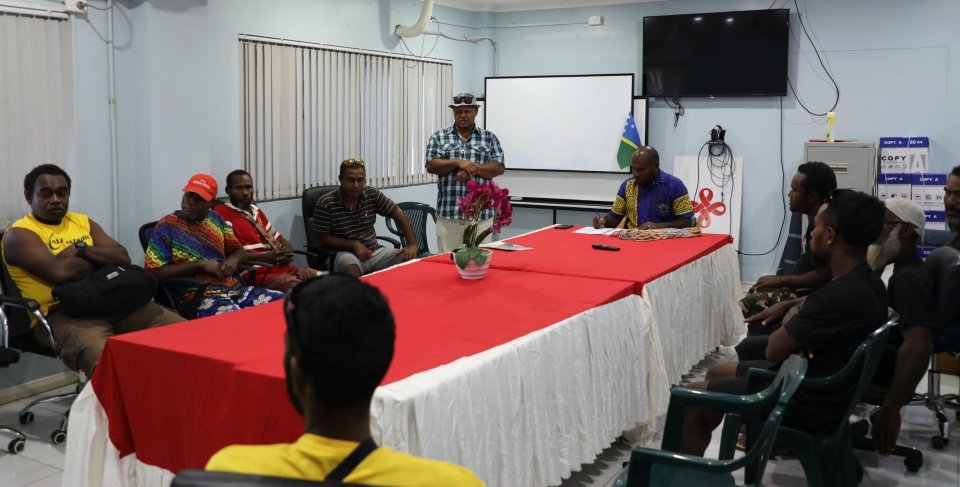THE Ministry of Rural Development (MRD), through its Rural Sustainable Program (RSDP), has approved a total funding support of $340,000 toward the establishment of the first-ever Fotana Tribe Fishery Project in East Fataleka, Malaita Province.
The initiative is aimed at boosting the local fishery within East Fataleka, where fish are abundant and have potential benefits to the local communities.
The project was the first of its kind for the tribal group to receive after more than ten years of hard work and struggle.
“The Fotana Tribe of East Fataleka has been anticipating this moment to hear a successful story after more than ten years of hard work and struggle.
“Today marks a new milestone for potential development for Fotana people as we witness the official announcement of the approval of a fishery project for our tribe,” Pastor Francis Tafoa, who spoke on behalf of Fotana chiefs and community leaders, said.
Pr. Tafoa was speaking during a small but significant ceremony held at the MRD on Wednesday, March 13, to witness the declaration and approval of funding support for the fishery project.
A Shell Money was presented following the announcement and approval, by Chief Robert Fuana to the ministry (MRD) through its Permanent Secretary, Dr. Samson Viulu, as a token of friendship and partnership in developing Fotana Tribal Land.
Chief Fuana, on behalf of the tribe, further expressed his profound gratitude and appreciation to MRD and PS Viulu for recognizing their important livelihood project.
He said that he looks forward to more development as his tribes open the door to new development initiatives for Fotana land.
“Fotana people believe in good planning and togetherness to accomplish our goals and objectives. We want to set an example for Malaita as a whole to see development from a positive perspective,” Chief Fuana emphasized.
Fotana Tribal Land Trust Board Inc. is a registered charitable body that works on behalf of the Fotana Tribe, which owns a registered land area of more than 600 hectares.

The team has been very optimistic about creating another development hub for East Fataleka and surrounding areas.
The vision is now taking shape as they now have their first fishing project.
“The possibility for more development has been appreciated, and we are committed to successfully implementing this project and seeing it grow,” Mr. Fuana said.
The Fotana tribe expressed profound gratitude and appreciation to the People’s Republic of China for funding the project and is looking forward to working closely with the next government through the Ministry of Rural Development for more development for Fotana.
Pastor Tafoa and Chief Fuana, when speaking on behalf of their tribe, made it clear that the Fotana Tribe of Fataleka is open to all development partners, especially China, to come and develop their land and resources through partnership arrangements.
“We are friendly, law-abiding people of Fataleka, and we truly welcome the support from the Government of the Peoples Republic of China (PRC) and look forward to further collaboration in other areas of development in Fataleka in the years ahead,” they said.
Meanwhile, MRD Permanent Secretary Dr. Samson Viulu commended the Fotana Tribe, its chiefs, and their community leaders for working together to achieve this new milestone in their community.
He said the ministry is committed and will continue to work alongside the Fotana tribe to ensure the project is successfully implemented.
“Such a gesture demonstrates a firm commitment that your tribe has to rural development. Therefore, as the ministry responsible for rural development, MRD is fully committed to seeing that all rural Solomon Islanders meaningfully participate in development activities to improve their social and economic livelihoods,” PS Viulu said.
RSDP is a partnership program between the Ministry of Rural Development and the People’s Republic of China (PRC) aimed at improving the social and economic development and livelihood of citizens in the rural areas of the Solomon Islands.
Core priority areas of the program are socio-economic infrastructure development and income-generating projects in all of the Solomon Islands, with the outcome of achieving integrated sustainable development focusing on 75% of those who live in remote rural areas and strengthening the effective participation of indigenous people and local communities in socio-economic initiatives.